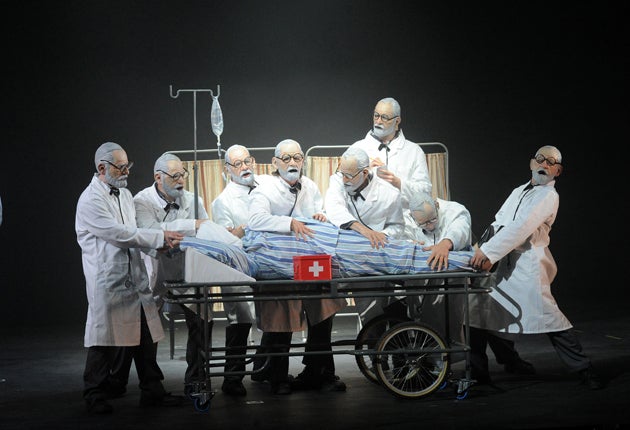The Love for Three Oranges, Grange Park, Hampshire<br/>Capriccio, Grange Park, Hampshire<br/>Susan Bullock, St Bartholomew’s Church, Sydenham
Two operatic oddities, and a request to sponsor body parts, lift the spirits at Grange Park

Petit Trianon to Glyndebourne’s Versailles, Grange Park Opera is more attuned to the times than it might appear.
Instead of sponsoring roles for next season’s operas, patrons are now invited to sponsor body parts. (Isolde’s head is still up for grabs.) Even the dress code has been relaxed for a few performances, albeitwith injunctions to “wear fabulous shoes!” or “raid the attic dressing-up box!”. At this rate, we’ll be bidding for vital organs next year, while a doner kebab van idles on the lawn. Or will we? Ticket sales for the 2010 season are up, and with Tosca as its recession-busting banker, Grange Park is fielding two operatic oddities, Capriccio and The Love for Three Oranges.
Director-designer David Fielding’s production of Prokofiev’s jazz-age commediafable is a giddy, gawky, rowdy affair. Combative choruses, sung from the auditorium, clamour for tragedy, comedy, lyric drama and farce – the last of which prevails. Vomiting “tragic prose and boring verse”, complaining of a cough and diagnosed with incurable melancholia by a team of identical doctors in Sigmund Freud masks, the Prince (Jeffrey Lloyd-Roberts) is condemned to search for love in citrus form when he laughs at Fata Morgana (Rebecca Cooper), the bad fairy who wants to depose the King of Clubs (Clive Bayley) and vanquish his sorcerer supporter, Tchelio (Vuyani Mlinde). “Gueule chance!” as the libretto says.
Energy is the key to this whirling, swirling, silly bagatelle, though Fielding’s circus and cabaret imagery loses cohesion when Dr Who’s Tardis appears on stage and the three Princesses (Rosie Bell, Lilly Papaioannou and Belinda Williams) emerge from giant Innocent juice cartons. Much of the zest comes from young conductor Leo Hussain, who whips the English Chamber Orchestra into a rat-a-tat frenzy in the brazen March and crazy-mirror Scherzo. A dab-hand at neurotic nerds, Lloyd-Roberts imbues the Prince with a welcome dash of desperate pathos, though Wynne Evans steals the show as his comic side-kick, Trouffaldino, with a suitcase of rubber chickens.
Capriccio is arguably weaker than The Love for Three Oranges. Strauss’s sublime opening string sextet and exquisite closing monologue frame a rambling, repetitive debate on the relationship of words and music and the purpose of opera – a light dinner-party conversation decorated by references to Gluck, Beaumarchais and Couperin, and set in the last years before the French Revolution.
Just as the 1916 version of Ariadne represented a flight from reality, so does this 1942 Rococo fantasy. But Stephen Medcalf's delicate 1940s production makes Capriccio a valediction to pre-fascist Germany, the elderly composer's sorrow, bafflement and nostalgia conveyed in the tender face of the Countess (Susan Gritton) as she takes her place on a scruffy rehearsal stage and listens to the music curling up from the orchestra pit. Beneath the stage hides the prompter, Monsieur Taupe (Stuart Kale), with a Star of David chalked on the back of his suit. Beyond the dressing-room doors (designs and lighting by Francis O'Connor and Peter Mumford), Munich is in ruins.
Under Stephen Barlow's calm, steady beat, the opulent orchestral score unfolds sweetly and clearly. Torn between the poet Olivier (Roderick Williams) and the composer Flamand (Andrew Kennedy), the Countess plans a divertissement with the pompous theatre director La Roche (Matthew Best), teases her brother (Quirijn de Lang) over his infatuation with the actress Clairon (Sara Fulgoni), and is entertained by a dancer (Bryony Perkins) and two preposterous Italian singers (Sally Johnson and Wynne Evans).
Spectacular effects and grand historical subjects are discussed in a tiny 18th-century theatre with wave machines. Period costumes are donned and discarded, hot chocolate and pannetone are served, the Countess's romantic crisis finally deferred to another day. Nothing happens but every detail is thoughtful and unobtrusive, the singing impassioned and enchantingly blended. Rarely has such an apparently flimsy work been so poignant.
St Bartholomew's Church, Sydenham, was transformed into the Villa Wesendonck during Susan Bullock's performance of Wagner's Wesendonck Lieder with conductor Robert Trory and the St Bartholomew Festival Orchestra last weekend.
Scratch bands don't come finer than this (sharp-eyed listeners will have spotted principals from the LSO, LPO and Philharmonia), or local festivals more ambitious than Sydenham Music. Luxuriant of tone and gloriously firm, Bullock's voice is thrilling at close range, losing none of its edge, sophistication or sensuality at the softest dynamic. Felix Mottl's orchestration of Wagner's narcotic love songs leaves one wanting to hear the Liebestod, but Trory's breezy account of Ravel's orchestral fancy, Le Tombeau de Couperin, led instead to a selection from Canteloube's Chants d'Auvergne. No need for angst here, just blissed-out portamento and sun-warmed simplicity. Bullock's Wagnerian career may have swept her past such girlish repertoire, but her voice is still nimble and true. Encores of "O mio babbino caro" and an unaccompanied Welsh folk-song were sensational.
'The Love for Three Oranges': (01962 737366) to 4 Jul. 'Cap-riccio': (01962 737366) to 2 Jul
Next Week:
Anna Picard heads for Cardiff and Bryn Terfel's debut as Hans Sachs in Richard Jones's WNO production of Die Meistersinger
Subscribe to Independent Premium to bookmark this article
Want to bookmark your favourite articles and stories to read or reference later? Start your Independent Premium subscription today.

Join our commenting forum
Join thought-provoking conversations, follow other Independent readers and see their replies